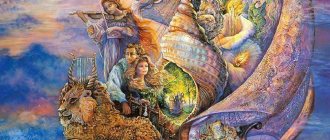The white crow is a very rare bird, so people who fall very far from society and social norms of behavior are also called that. Since albino crows have become an extremely rare phenomenon in recent decades, we can talk more about phraseological units. Why do individuals choose this image: by their own will or from birth?
What does "white crow" mean?
The expression “white crow” is used in 2 meanings:
- In the natural world - an albino crow. Albinism is an anomaly, creatures with a similar disease are considered special.
- A black sheep in society is a person who stands out from the crowd with his views, tastes, manners and behavior.
White crows are very unadapted in nature; it is difficult for them to hide from predators due to their light plumage. They are not like others. This explains the origin of the phraseological unit “white crow”; this is how people with unusual behavior began to be called, who stand out from the crowd with their manners and views. This expression is characteristic of two polar personality types:
- Artists, writers, scientists living in their own world of sounds, images and imagination.
- People are stupid and narrow-minded, who are lazy or find it difficult to rise to the generally accepted level.
Other phraseological units
Hunger is not a big deal
statement of extreme need.
How to give something to drink
Guarantee of an easy and mandatory solution to the issue.
Eye and eye
Someone or something needs careful supervision and vigilant surveillance.
Lost hour
Wasted time, long meaningless wait.
All phraseological units
A book from the authors of this article!
Collection: “100 popular phraseological units of the Russian language”
More details
"White Crow" - psychology
As a term, this phrase has found application in psychology. By the standards of psychology, a “black sheep” is a person whom society considers a stranger because of his dissimilarity to others. This is not about appearance, but about moral values and assessments of what is happening. Often teenagers or creative individuals choose this behavior in order to express themselves and achieve recognition. Characteristics of such people:
- do not hide their views that differ from the generally accepted ones and are proud of them;
- do not want to accept society’s stereotypes in order to pass as one of their own;
- demonstrate their opposition to the principles of society.
Using an Expression
In social psychology, the “black sheep” effect (the “black sheep” effect) is that members of an ingroup are perceived in a group as more polarized than members of an outgroup. This is expressed, for example, in the fact that an ingroup member who fulfills the norms is perceived more positively than an outgroup member who fulfills the same norms, and an ingroup member who does not fulfill the norms is perceived more negatively than an outgroup member who does not fulfill the norms.
Even in the animal world they try to avoid the white crow; in the human community the situation is similar. In almost every team there is a similar person who is sharply different from the rest. The general features of the “white crow” are a sign of absolute unusualness, that is, a person with oddities, an outcast (expelled from the community). Thanks to gossip and rumors, various labels are put on the “eccentric”, sometimes in exaggeration they are even called crazy somewhere. In psychology, this phenomenon is designated by the special term mobbing. Social psychologists note that from the first days of its existence, any community (team) strives to stratify itself in accordance with socio-psychological archetypes. The group unconsciously distributes and selects the most suitable candidates for a particular social role and actually forces the selected objects into their respective niches. The role of outsider goes to people with certain characteristics (“black sheep”) who do not find support and approval from other members of the group. From the first mistakes and failures, an indelible stigma falls on a person, with which he is doomed to live for subsequent years, being an object of ridicule and outright bullying.
- Jessica Mitford, an English writer, journalist and political activist who came from an aristocratic family of fascists, referred to herself as “the red sheep of the family” when speaking about her communist beliefs.
- Songs with the title “White Crow” are in the repertoire of Valery Leontyev (aria from the rock opera “White Crow. Joan of Arc”, 1989) and the group “Chaif” (album Dermontin, 1987).
- In the song “Our Family” by the group Nautilus Pompilius (album “Separation”, 1986) there are the lines:
- In the newspaper "Soviet Sport" in the late 1980s - early 1990s. there was a section “White Crows Club”, where materials were published for lovers of running and a healthy lifestyle.
- In 1990, a new theater group appeared in St. Petersburg, which later received the name “Theater of Rains”. The symbol of the theater is the “white crow”. The theater troupe presents itself and all its spectators as black sheep who are not like everyone else and it is in this difference that they see their main advantage. “The theater’s regular spectators are doctors, teachers, engineers, as well as modern youth: students and high school students. People, tired of bitterness, insensitivity, and misunderstanding, from the cruelty of our time, have been coming to this theater for many years... “White Crows” who flock into one flock under the roof of the “Theater of Rains.” The theater still exists today.
- In the series of novels by George R.R. Martin “A Song of Ice and Fire” (and the TV series “Game of Thrones”), among the characters there is a character called “Blackfish”. He gave himself the nickname after a conversation with his older brother, in which he called his brother “the black sheep of the Tully herd.” Brynden laughed and remarked that since the crest of their house was a jumping trout, he was more of a “black fish” than a “black sheep” - and from that day on he made the black trout his personal crest.
Is it easy to be a “black sheep”?
A “White Crow” is a person with his own character traits; unlike a nonconformist, such a person does not set out to stand out, he simply considers his moral values to be more correct. At all times, such people have had a hard time because:
- they are misunderstood, offended and often despised;
- trying to suppress individuality;
- they are lonely or find friends among the same individuals;
- their opinion is ignored by the majority.
What to do if you are a “black sheep”?
Many parents are interested in the question: how to live as a “black sheep”? Children themselves are not always burdened by loneliness; sometimes teenagers even strive to show their difference. And the mother and father are concerned about how the child will manage in adulthood. Often adults are burdened by their inability to adapt to society. Psychologists give the following recommendations:
- do not treat your environment aggressively, remain friendly, accept the views of other people;
- celebrate what you can learn from others;
- calmly express your position, without offense or categorical judgments;
- If the problem is a physical disadvantage, such as being tall or short, you can turn it into a strength. Sign up for modeling courses, basketball, or become a salesperson in a clothing store for short people;
- get used to your individuality, accept and love yourself as you are.
Therapy for adults
Work with a psychologist is carried out systematically at the same time, in the same place.
The client should feel comfortable. The road to recovery will be long. A doctor must be a reliable person who believes in his client. A large supply of mental resources is required from him. Its goal is the rejection of traumatic events. Victims are rarely helped by conversations that life will change if they love themselves and begin to take responsibility. If the psychotherapist takes the wrong approach, the patient’s condition may worsen, because he will decide that the problem is him, and nothing will help him. Alienation trauma is treated comprehensively. The rejected person must realize his worth, see the cause of the trauma, understand how it affects him now. There are different psychotherapeutic approaches in which the victim learns to notice his feelings, build and defend boundaries. Whatever path the psychologist chooses, it is important that his relationship with the client does not begin to resemble a parent-child interaction. A true professional is confident in success, he is ready for complex and lengthy work and will definitely help everyone in need. The rejected person needs to carefully choose a specialist with whom he will feel comfortable. Share:
How to become a “black sheep”?
It is very easy to fall into the category of those who are called “black sheep”; it will be enough to express views radically opposite to generally accepted positions, change the style of clothing, hairstyle and manner of speaking. Give up your mobile phone, iPad, iPhone, pages on social networks, demonstrate your independence from norms. Although recently, sentiment on the Internet has begun to highlight the concept of “black sheep” as a positive when it comes to business on social networks. Advice on what you need to not be afraid of being a “black sheep”:
- come up with an original idea for your ad;
- surprise the audience with an interesting offer;
- do not be afraid to invite guests and communicate;
Parable of the White Crow
The unique light plumage gave rise to the instructive parable of the white crow. Since childhood, she was not loved for her strange color, so she had to grow up quickly. Many hated this crow, but she could not understand why and why. They did dirty tricks, but the bird responded kindly to insults, and in order to communicate less, it began to soar high in the sky, away from its relatives. The life of the white crow was difficult, but she grew up strong and resilient, for which she was envied even more.
And one day a white crow decided to fly away in search of white birds like her, so that she could be accepted into a new flock. And only after the disappearance of the white bird did others appreciate its qualities and began to regret their mistakes. The moral of this parable is that you should not be afraid to be yourself, maintain pride and dignity, be able to look for like-minded people and never try on someone else’s fate.
Black sheep
The query "Black Sheep" redirects here; see also other meanings. The request "Black Sheep" redirects here; see also other meanings.
Black sheep among "normal" whites
In many European languages, a partial analogue of the Russian expression “white crow” is the idiom “black sheep”. For example, English black sheep (“black sheep”, “black lamb”).
The expression is also present in French, Armenian, Serbian, Bulgarian, Portuguese, Bosnian, Greek, Turkish, Dutch, Spanish, Czech, Slovak, Romanian, Polish, Ingush, Finnish and Hebrew.
The expression tends to have a stronger negative connotation than the idiom "white crow" in Russian, often symbolizing waywardness. The expression "black sheep" comes from the contradiction between (normal) white sheep and the different black ones. The typical white color of sheep's wool is not due to albinism, but to a dominant gene. In order for a white sheep to give birth to a black lamb from a white ram, both parents must be heterozygous for the recessive “blackness” gene. But even in this case, the probability of giving birth to a black lamb is only 25%. It was commercially unprofitable to keep black sheep, since their wool was of low value and could not be dyed the desired color. Therefore, black sheep were culled, not allowed to reproduce, and all black lambs appearing again in the herd were born from white parents. In addition, due to a lack of understanding of the reasons for this phenomenon, in England in the 18th and 19th centuries, the black lamb was considered “marked by the devil.”
Pacer
I gallop, but I gallop differently, Through fields, through puddles, through dew... My running is called an amble, which means - Differently, that is, not like everyone else.
Vladimir Vysotsky.
Thus, the appearance of black sheep in a herd remained a consistently rare, unexpected and undesirable event, which is reflected in the expression “black sheep.” Over time, the sharply negative meaning of the expression softened somewhat, but even now the everyday expression “black sheep” carries a double meaning: the exclusivity of a member of the community and the undesirability of his presence in the community. If the first part brings this expression closer to the Russian “white crow”, then the second - with the expression “black sheep”.










